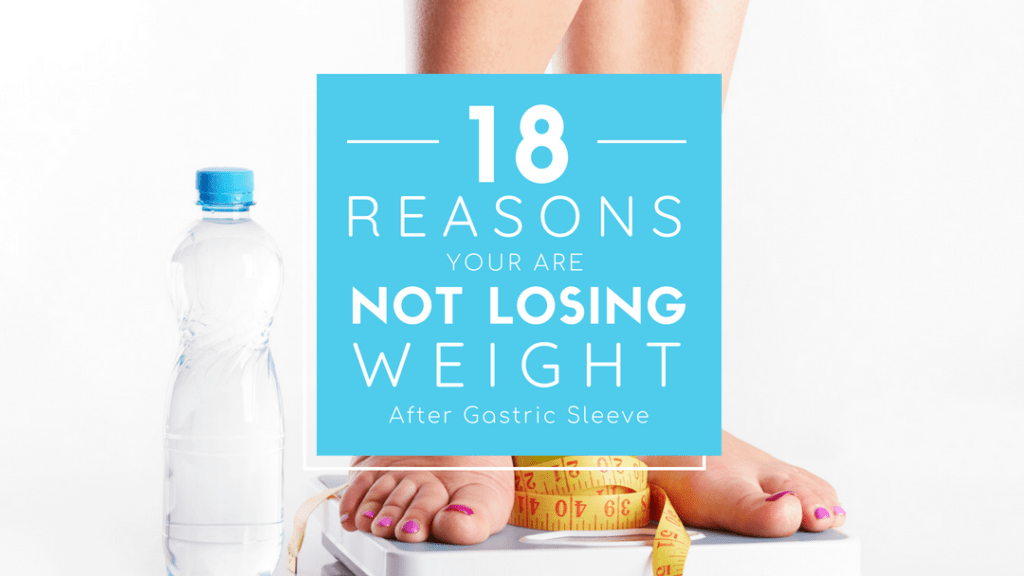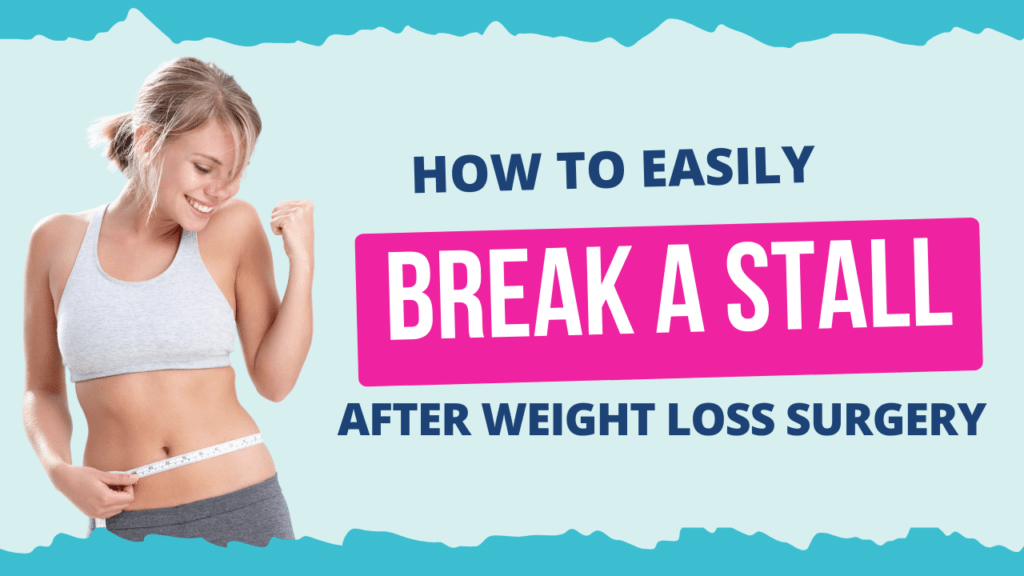There are at least 18 potential reasons for not losing weight after gastric sleeve surgery.
It is imperative that you address these issues as soon as possible as it will be the difference between long-term success and complete failure.
What Does Not Losing Weight Mean?
Not losing weight after gastric sleeve surgery usually means that something is not right. In order to start losing weight again, you must be diligent by crossing every reason listed off your list. Please visit our store for products that can really help you get back on track and start losing weight again. Many of these reasons can be resolved with bariatric-specialize diet products that we offer or recommend.
1. Not Following the Post-Op Diet
Clearly, the #1 reason you are not losing weight after gastric sleeve surgery is the lack of information about a proper post-op diet or the lack of discipline to follow the post-op diet. The pre-op and post-op diet is in place for a reason. Because they work!
2. Not Enough Protein
Protein is absolutely vital to lose weight and stay healthy. There are a variety of reasons why protein intake affects losing weight. Make sure you are eating 60-90 grams of protein per day!
Protein-rich diet plans to jumpstart your weight loss:
3. Eating Too Much or Too Little
Yeah eating too much is obvious, but eating too little??? You would be surprised! Eating too little can be just as detrimental to not losing weight as eating too much. Make sure you eat protein first and stick to the post-op diet.
Here is a complete meal planning guide to make sure you’re eating the right amount for optimal weight loss.
4. Water Retention [Not Enough Water]
Water is super important. If you do not drink enough water, your body becomes dehydrated. When you’re dehydrated your body can’t flush out toxins or regulate itself to its full capacity.
Water gets depleted from your body very quickly so it’s important to drink all throughout the day. Remember to sip sip sip. At least 48-64 ounces per day.
5. Drinking Alcohol and Other Liquid Calories
Drinking alcohol or any other “liquid calories’ after gastric sleeve surgery is not recommended. This includes beverages such as juice, milk, soda, sweet tea, mixers, etc.
Liquids do not help you feel full, provide very little nutrients, and they are full of sugar and calories. These type of liquids are the easiest way to prevent you from losing weight.
6. Consuming Unhealthy Calories or “Empty Calories”
Are you eating the right foods? Are you cheating on the post-op diet? Every calorie counts after gastric sleeve or gastric bypass because on a restricted diet it is important to get as many nutrients as possible from the foods you eat.
Without proper nutrition, unhealthy calories can result in a whole lot of problems resulting from nutritional deficiencies after gastric sleeve surgery.
7. Not Taking Bariatric Vitamins
No matter what, bariatric vitamins are required for the rest of your life after gastric sleeve surgery. If you’re currently taking non-bariatric vitamins, I suggest you check out our helpful products to find tasty, soft-chew bariatric vitamins.
8. Eating Processed Foods
Processed foods are EVERYWHERE. Even in some bariatric protein shakes, bars, and other products labeled organic, gluten-free, and “healthy”. Processed foods should be avoided after gastric sleeve surgery.
Here are 13 foods you MUST avoid after gastric sleeve surgery.
If you are not losing weight, keep a food journal to track your foods. If there are processed foods, cut them out to see if you start losing weight again and get back on track.
9. Change in Dietary Habits
Have any of your eating habits changed since you stopped losing weight? If so, take a few steps back to what you were eating while you were losing weight. If you need to adjust your diet, here are 20 healthy diet tips you should follow!
10. The Healing/Recovery Process
Your body will be thrown off track (to say the least). A huge portion of your stomach was removed and everything from emotional changes to physical changes can be drastically affected.
Recovering after surgery may take time, and if you aren’t losing weight as fast as you thought you would, it may because your body is still healing.
11. Body Adaptation to New Stomach
Sometimes there is no fix if the body takes time to adapt to the new sleeve-shaped stomach. It is not common to long-term impact the amount of weight you lose, but it can temporarily halt losing weight.
Do the best you possibly can to get everything right to encourage losing weight. It’s important to speak to your doctor, surgeon, or nutritionist if nothing you do is working.
12. Medications
Another huge factor. Medications… Have any medications changed since you stopped losing weight? You need to know not to make any serious changes (especially with medications) until you speak with your primary care physicians.
13. Lack of Exercise
Sometimes just following the post-op diet isn’t enough to succeed. Remember that gastric sleeve surgery isn’t a miracle fix. It’s a tool. Just like dieting and just like exercise.
Many times you need an array of tools to succeed with losing weight. Start exercising and applying physical activity to your daily life (or as often as you can).
Read the Beginner’s Guide to Exercising After Weight Loss Surgery.
14. Stress/Anxiety
Stress is like sleep – it can cause a huge amount of problems in your life. Food and eating was your outlet for stress at one point in time. So if you are stressed, find out what is making you stressed and try to take a step away from it.
If that is not possible, work on accepting the situation and working on the “things you can change, and not the things you can’t change”.
15. Sleep Patterns [Lack of Sleep or Too Much Sleep]
Sleep patterns have a massive impact on a ton of different things – including not losing weight after VSG. Make sure you get enough sleep, without oversleeping.
16. Work (Night Shifts Mainly)
Working night shifts actually impact losing weight surprisingly. We find a lot of bariatric patients who work night shifts have a significantly larger chance of gaining weight, stalling, or hitting a weight loss plateau at some point in time after sleeve surgery.
17. Gastric Sleeve Complications
Although extremely rare (less than 1%), gastric sleeve complications can happen. Sometimes complications can impact weight loss. See your doctor – but remember usually it is something you are doing that is the cause for not losing weight.
Don’t just assume or place blame on it being a complication if you’re not being honest with yourself and following healthy lifestyle habits after bariatric surgery.
18. Environment or Other Lifestyle Change
If none of these are the reasons you are not losing weight after gastric sleeve surgery, you need to take a serious look at your life – especially your environment.
Are you hanging out around the wrong people? Do you not have aftercare support? Are you not involved in forums or groups? For a lot of people, being around supportive people who motivate you and cheer you on plays a major role in long-term success.
Difference Between Not Losing Weight and Hitting a Stall
It is important to note the difference between hitting a stall and not losing weight completely. If you believe it’s a stall or plateau, you should read this guide.
Stalls can occur because of the body’s recovery, healing, adaptation, dietary changes, water retention, certain medications, changes in medications, changes in exercise, stress, sleep patterns, etc.
Although these reasons can also influence not losing weight for long periods of time, stalls generally are short term and should not last longer than a two week period.
Key Takeaway
Take an unbiased look at your life. Make sure you think about yourself first because weight loss surgery saves lives and resolves obesity-related comorbidities. You are not being selfish by making a commitment to your health in order to prolong your life.
It needs to be top-priority for patients to get back on track and start losing weight again so a stall does not become a long-term end to weight loss.
It’s essential to your success to be completely honest with your current doctor, dietitian, or our nutritionist to work out a plan that works best for you.
Remember you can’t help anybody if you don’t help yourself.
Resources:
- 5 Day Pouch/Sleeve Reset Diet Guide!
- Protein Shakes and Protein Bars after gastric sleeve surgery to fulfill protein requirements!
- Top 7 Favorite Bariatric Recipes
- Choosing the Right Diet – Pros and Cons of Popular Diets



This was extremely helpful for me. I had my sleeve surgery Nov. 2nd 2018. I lost 27 lbs by Dec. 18. I got weighed Feb. 15 and had only lost 5lbs. Now I know what I’m doing wrong. I have to flip the script.